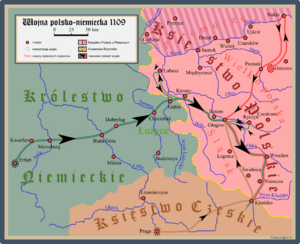Battle of Nakło (1109) facts for kids
Quick facts for kids Battle of Nakło |
|||||||
|---|---|---|---|---|---|---|---|
 Campaigns of the 1109 Polish-German conflict |
|||||||
|
|||||||
| Belligerents | |||||||
| Kingdom of Poland | Pomeranians | ||||||
| Commanders and leaders | |||||||
| Bolesław III Wrymouth | |||||||
| Casualties and losses | |||||||
| few | 30.000 | ||||||
The Battle of Nakło happened in 1109. It was a fight between the Polish army and the Pomeranian tribes. The battle took place near a town called Nakło nad Notecią. Duke Bolesław III Wrymouth led the Polish troops to victory.
Contents
What Caused the Battle?
Poland's Goals in Pomerania
In the summer of 1109, Duke Bolesław III of Poland decided to invade Pomerania. He wanted to expand Poland's control. His main goal was to capture the important castle of Nakło. He also hoped to make the Pomeranians fight a big battle.
A Diversion from Another War
This invasion was also a smart move to help Poland in another conflict. The German king, Emperor Henry V, was planning to invade Poland. He was encouraged by Bolesław's half-brother, Zbigniew, who wanted Bolesław's power. The attack on Pomerania was a way to distract the Germans. It made them think Poland was busy elsewhere.
The Battle of Nakło
The Siege and the Fight
On August 10, 1109, Bolesław's army was surrounding the castle of Nakło. The Pomeranians sent their own army to help the castle. Bolesław's forces met these relief troops and fought them. The Polish army won a clear victory. After this defeat, the city of Nakło surrendered to Duke Bolesław.
A Famous Victory
A writer named Gallus Anonymus wrote about this battle. He said that Bolesław's victory was a huge achievement. It was even compared to a famous win by King Otto I of Germany against the Hungarians in 955. Gallus Anonymus also wrote that the battle helped bring Christianity to the Pomeranians.
After the Battle
New Challenges for Bolesław
After winning at Nakło, Bolesław had to quickly move his army south. He had to face the German Imperial army at the Battle of Głogów. This shows how many challenges Bolesław faced at the time.
Spreading Christianity
Bolesław also sent a religious leader, Bishop Otto of Bamberg, to Pomerania. His job was to teach the people about Christianity. This was part of Bolesław's plan to bring the region under Polish influence.
Pomerania's Future
Even after the battle, the Pomeranians continued to fight for their independence. Duke Wartislaw I of Pomerania tried to resist Polish rule. Later, in 1181, Wartislaw's son, Duke Bogislaw I, became a "vassal" of the Holy Roman Emperor. This meant he promised loyalty to the Emperor, but still ruled his own land.
 | William M. Jackson |
 | Juan E. Gilbert |
 | Neil deGrasse Tyson |

